#Continuity
Explore tagged Tumblr posts
Text
"But surely these two books are set in the same universe, so" buddy, I'm not even going to commit to two chapters of the same book being set in the same universe. On a good day I can just about maintain continuity of milieu among consecutive paragraphs.
522 notes
·
View notes
Text
A genre of commentary I find extremely amusing is people watching old 90s/early 00s cartoons and debating about "plot holes."
Because listen. My sweet, summer children, continuity in cartoons did not used to exist. Things just happened in one episode and they were immediately erased after the credits roll.
Every single episode (except for Extra Special Two Part Episodes or sometimes THREE part) existed in its own, self contained Alternate Universe. Never to be mentioned again.
406 notes
·
View notes
Text
An essay on Furiosa, the politics of the Wasteland, Arthurian literature and realistic vs. formalistic CGI

Mad Max: Fury Road absolutely enraptured me when it came out nearly a decade ago, and I will cop to seeing it four times at the theatre. For me (and many others who saw the light of George Miller) it set new standards for action filmmaking, storytelling and worldbuilding, and I could pop in its Blu Ray at any time and never get tired of it. Perhaps not surprisingly, I was deeply apprehensive about the announced prequel for Fury Road's actual main character, Furiosa, even if Miller was still writing and directing. We didn't need backstory for Furiosa—hell, Fury Road is told in such a way that NOTHING in it requires explicit backstory. And since it focuses on the Yung Furiosa, it meant Charlize Theron couldn't return with another career-defining performance. Plus, look at all that CGI in the trailer, it can't be as good as Fury Road.
Turns out I was silly to doubt George Miller, M.D., A.O., writer and director of Babe: Pig in the City and Happy Feet One & Two.
Furiosa: A Mad Max Saga is excellent, and I needn't have worried about it not being as good as Fury Road because it is not remotely trying to be Fury Road. Fury Road is a lean, mean machine with no fat on it, nothing extraneous, operating with constant forward momentum and only occasionally letting up to let you breathe a little; Furiosa is a classical epic, sprawling in scope, scale and structure, and more than happy to let the audience simmer in a quiet, almost painfully still moment. If its opening spoken word sequence by that Gandalf of the Wastes himself, the First History Man, didn't already clue you in, it unfolds like something out of myth, a tale told over and over again and whose possible embellishments are called attention to in the dialogue itself. Where Fury Road scratched the action nerd itch in my head like you wouldn't believe, Furiosa was the equivalent of Miller giving the undulating folds of my English major brain a deep tissue massage. That's great! I, for one, love when sequels/prequels endeavour to be fundamentally different movies from what they're succeeding/preceding, operating in different modes, formats and even genres, and more filmmakers should aim for it when building on an existing series.
This movie has been on my mind so much in the past week that I've ended up dedicating several cognitive processes to keeping track of all of the different ponderings it's spawned. Thankfully, Furiosa is divided into chapters (fun fact: putting chapter cards in your movie is a quick way to my heart), so it only seems fitting that I break up all of these cascading thoughts accordingly.
1. The Pole of Inaccessibility
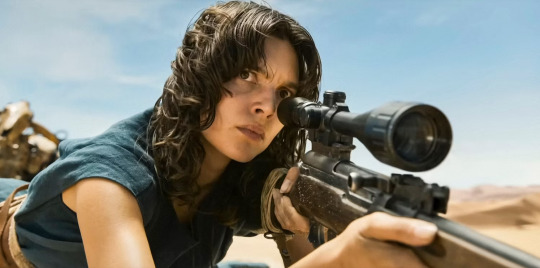
Furiosa herself actually isn't the protagonist for the first chapter of her own movie, instead occupying the role of a (very crafty and resourceful) damsel in distress for those initial 30-40 minutes. The real hero of the opening act, which plays out like a game of cat and mouse, is Furiosa's mother Mary Jabassa, who rides out into the wasteland first on horseback and then astride a motorcycle to track down the band of raiders that has stolen away her daughter. Mary's brought to life by Miller and Nico Lathouris' economical writing and a magnetic performance by newcomer Charlee Fraser, who radiates so much screen presence in such relatively little time and with one of those instant "who is SHE??" faces. She doesn't have many lines, but who needs them when Fraser can convey volumes about Mary with just a flash of her eyes or the effortless way she swaps out one of her motorcycle's wheels for another. To be quite candid, I'm not sure of the last time I fell in love with a character so quickly.
You notice a neat aesthetic contrast between mother and daughter in retrospect: Mary Jabassa darts into the desert barefoot, clad in a simple yet elegant dress, her wolf cut immaculate, only briefly disguising herself with the ugly armour of a raider she just sniped, and when she attacks it's almost with grace, like some Greek goddess set loose in the post-apocalyptic Aussie outback with just her wits and a bolt-action rifle; we track Furiosa's growth over the years by how much of her initially conventional beauty she has shed, quite literally in one case (hair buzzed, severed arm augmented with a chunky mechanical prosthesis, smeared in grease and dirt from head to toe, growling her lines at a lower octave), and by how she loses her mother's graceful approach to movement and violence, eventually carrying herself like a blunt instrument. Yet I have zero doubt the former raised the latter, both angels of different feathers but with the same steel and resolve. Of fucking course this woman is Furiosa's mother, and in the short time we know her we quickly understand exactly why Furiosa has the drive and morals she does without needing to resort to didactic exposition.
Anyway, I was tearing up by the end of the first chapter. Great start!
2. Lessons from the Wasteland
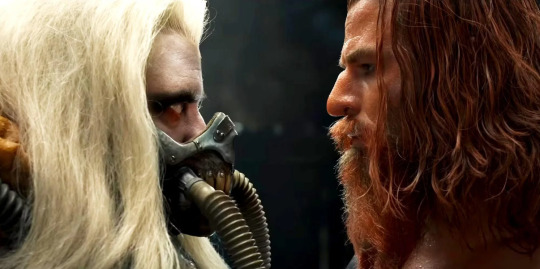
Most movies—most stories, really—don't actually tell the entire narrative from A to Z. Perhaps the real meat of the thing is found from H to T, and A-G or U-Z are unnecessary for conveying the key narrative and themes. So many prequels fail by insisting on telling the A-G part of the story, explaining how the hero earned a certain nickname or met their memorable sidekick—but if that stuff was actually interesting, they likely would have included it in the original work. The greatest thing a prequel can actually do is recontextualize, putting iconic characters or moments in a new light, allowing you to appreciate them from a different angle. All of season 2 of Fargo serves to explain why Molly Solverson's dad is appropriately wary when Lorne Malvo enters his diner for a SINGLE SCENE in the show's first season. David's arc from the Alien prequels Prometheus and Covenant—polarizing as those entries are—adds another layer to why Ash is so protective of the creature in the first movie. Andor gives you a sense of what it's like for a normal, non-Jedi person to live under the boot of the Empire and why so many of them would join up with the Rebel Alliance—or why they would desire to wear that boot, or even just crave the chance to lick it.
Furiosa is one of those rare great prequels because it makes us take a step back and consider the established world with a little more nuance, even if it's still all so absurd. In Fury Road, Immortan Joe is an awesome, endlessly quotable villain, completely irredeemable, and basically a cartoon. He works perfectly as the antagonist of that breakneck, Road Runner and Wile E. Coyote-ass movie, but if you step outside of its adrenaline-pumping narrative for even a moment you risk questioning why nobody in the Citadel or its surrounding settlements has risen up against him before. Hell, why would Furiosa even work for him to begin with? But then you see Dementus and company tear-assing around the wasteland, seizing settlements and running them into the ground, and you realize Joe and his consortium offer something that Dementus reasonably can't: stability—granted, an unwavering, unchangeable stability weighted in favour of Joe's own brutal caste system, but stability nonetheless. It really makes you wonder, how badly does a guy have to suck to make IMMORTAN JOE of all people look like a sane, competent and reasonable ruler by comparison?!?
…and then they open the door to the vault where he keeps his wives, and in a flash you're reminded just how awful Joe is and why Furiosa will risk her life to help some of these women flee from him years later. This new context enriches Joe and makes it more believable that he could maintain power for so long, but it doesn't make him any less of a monster, and it says a lot about Furiosa's hate for Dementus that she could grit her teeth and work for this sick old tyrant.
3. The Stowaway
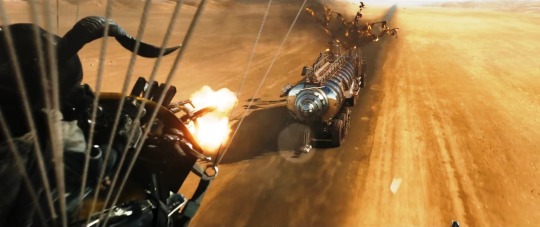
Here's another wild bit of trivia about this movie: you don't actually see top-billed actress Anya Taylor-Joy pop up on screen until roughly halfway through, once Furiosa is in her late teens/early twenties. Up until this point she's been played by Alyla Browne, who through the use of some seamless and honestly really impressive CGI has been given Anya's distinctive bug eyes [complimentary]. It's one of those bold choices that really works because Miller commits to it so hard, though it does make me wish Browne's name was up on the poster next to Taylor-Joy's.
Speaking of CGI, I should talk about what seems to be a sticking point for quite a few people: if there's been one consistent criticism of Furiosa so far, it's that it doesn't look nearly as practical or grounded as Fury Road, with more obvious greenscreen and compositing, and what previously would've been physical stunt performers and pyrotechnics have been replaced with their digital equivalents for many shots. Simply put, it doesn't look as real! For a lot of people, that practicality was one of Fury Road's primary draws, so I won't try to quibble if they're let down by Furiosa's overt artificiality, but to be honest I'm actually quite fine with it. It helps that this visual discrepancy doesn't sneak up on you but is incredibly apparent right from the aerial zoom-down into Australia in the very first scene, so I didn't feel misled or duped.
Fury Road never asks you to suspend your disbelief because it all looks so believable; Furiosa jovially prods you to suspend that disbelief from the get-go and tune into it on a different wavelength. It's a classical epic, and like the classical epics of the 1950s and 60s it has a lot of actors standing in front of what clearly are matte paintings. It feels right! We're not watching fact, we're watching myth. I'm willing to concede there might be a little bit of post-hoc rationalization on my part because I simply love this movie so much, but I'm not holding the effects in Furiosa to the same standard as those in Fury Road because I simply don't believe Miller and his crew are attempting to replicate that approach. Without the extensive CGI, we don't get that impressive long, panning take where a stranded Furiosa scans the empty, dust-and-sun-scoured wasteland (75% Sergio Leone, 25% Andrei Tarkovsky), or the Octoboss and his parasailing goons. For the sake of intellectual exercise I did try imagining them filming the Octoboss/war rig sequence with the same immersive practical approach they used for Fury Road's stunts, however I just kept picturing dead stunt performers, so perhaps the tradeoff was worth it!
4. Homeward

Around the same time we meet the Taylor-Joy-pilled Furiosa in Chapter 3, we're introduced to Praetorian Jack, the chief driver for the convoys running between the Citadel and its allied settlements. Jack's played by Tom Burke, who pulled off a very good Orson Welles in Mank! and who I should really check out in The Souvenir one of these days. He's also a cool dude! Here are some facts about Praetorian Jack:
He's decked out in road leathers with a pauldron stitched to one shoulder
He's stoic and wary, but still more or less personable and can carry on a conversation
Professes to a certain cynicism, to quote Special Agent Albert Rosenfield, but ultimately has a capacity for kindness and will do the right thing
Shoots a gun real good
Can drive like nobody's business
So in other words, Jack is Mad Max. But also, no, he clearly isn't! He looks and dresses like Mad Max (particularly Mel Gibson's) and does a lot of the same things "Mad" Max Rockatansky does, but he's also very explicitly a distinct character. It's a choice that seems inexplicable and perhaps even lazy on its face, except this is a George Miller movie, so of course this parallel is extremely purposeful. Miller has gone on record saying he avoids any kind of strict chronology or continuity for his Mad Max movies, compared to the rigid canons for Star Trek and Star Wars, and bless him for doing so. It's more fun viewing each Mad Max entry as a new revision or elaboration on a story being told again and again generations after the fall, mutating in style, structure and focus with every iteration, becoming less grounded as its core narrative is passed from elder to youth, community to community, genre to genre, until it becomes myth. (At least, my English major brain thinks it's more fun.) In fact there's actually something Arthurian to it, where at first King Arthur was mentioned in several Welsh legends before Geoffrey of Monmouth crafted an actual narrative around him, then Chrétien de Troyes added elements like Lancelot and infused the stories with more romance, and then with Le Morte d'Arthur Thomas Malory whipped the whole cycle together into one volume, which T.H. White would chop and screw and deconstruct with The Once and Future King centuries later.
All this to say: maybe Praetorian Jack looks and sounds and acts like Max because he sorta kinda basically is, being just one of many men driving back and forth across the wasteland, lending a hand on occasion, who'll be conflated into a single, legendary "Mad Max" at some point down the line in a different History Man's retelling of Furiosa's odyssey. Sometimes that Max rips across the desert in his V8 Interceptor, other times driving a big rig. Perhaps there's a dog tagging along and/or a scraggly and at first aggravating ally played by Bruce Spence or Nicholas Hoult. Usually he has a shotgun. But so long as you aren't trying to kill him, he'll help you out.
5. Beyond Vengeance
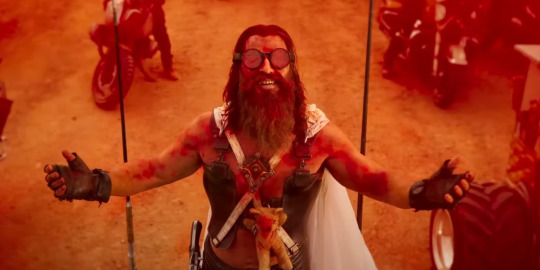
The Mad Max movies have incredibly iconic villains—Immortan Joe! Toecutter! the Lord Humongous!—but they are exactly that, capital V Villains devoid of humanizing qualities who you can't wait to watch bad things happen to. Furiosa appears to continue this trend by giving us a villain who in fact has a mustache long enough that he could reasonably twirl it if he so wanted, but ironically Dementus ends up being the most layered antagonist in the entire series, even moreso than the late Tina Turner's comparatively benevolent Aunty Entity from Beyond Thunderdome. And because he's played by Chris Hemsworth, whose comedic delivery rivals his stupidly handsome looks, you lock in every time he's on screen.
Something so fascinating about Dementus is that, for a main antagonist, he's NOT all-powerful, and in fact quite the opposite: he's more conman than warlord, looking for the next hustle, the next gullible crowd he can preach to and dupe—though never for long. For all his bluster, at every turn he finds himself in way over his head and writing cheques he can't cash, and this self-induced Sisyphean torment makes him riveting to watch. You're tempted to pity Dementus but it's also quite difficult to spare sympathy for someone who's so quick to channel their rage and hurt and ego into thoughtless, burn-it-all-down destruction. When you're not laughing at him, you're hating his guts, and it's indisputably the best work of Chris Hemsworth's career.
It's in this final chapter that everything naturally comes to a head: Furiosa's final evolution into the character we meet at the start of Fury Road, the predictable toppling of Dementus' precariously built house of cards, and the mythmaking that has been teased since the very first scene becoming diagetic text, the last of which allows the movie to thoroughly explore the themes of vengeance it's been building to. A brief war begins, is summarized and is over in the span of roughly a minute, and on its face it's a baffling narrative choice that most other filmmakers would have botched. But our man Miller's smart enough to recognize that the result of this war is the most foregone of conclusions if you've been paying even the slightest bit of attention, so he effectively brushes past it to get to the emotional heart of the climax and an incredible "Oh shit!" payoff that cements Miller as one of mainstream cinema's greatest sickos.
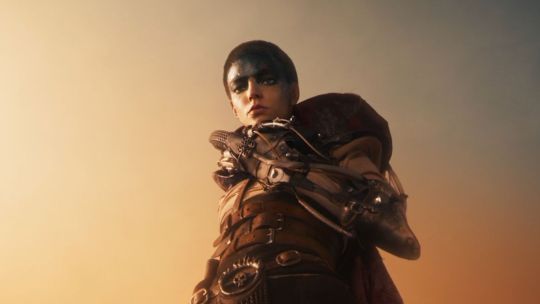
Fury Road remains the greatest Mad Max film, but Furiosa might be the best thing George Miller has ever made. If not his magnum opus, it does at least feel like his dissertation, and it makes me wish Warner Bros. puts enough trust in him despite Furiosa's poor box office performance that he's able to make The Wasteland. Absolutely ridiculous that a man just short of his 80th birthday was able to pull this off, and with it I feel confident calling him one of my favourite directors.
#furiosa: a mad max saga#mad max#mad max: Fury road#furiosa#imperator furiosa#george miller#mary jabassa#dementus#praetorian jack#immortan joe#max rockatansky#analysis#essay#anya taylor-joy#chris hemsworth#charlee fraser#tom burke#charlize theron#continuity#canon#arthurian literature#arthurian mythology#the matter of britain#king arthur#alyla browne
957 notes
·
View notes
Text
ACK-
Y’all I just caught the sweetest continuity moment in Rise. One of the last times they fought… wild animal Shredder(?), Donnie threw literally everything he had at him and the Shredder still overpowered him in a matter of seconds, destroying his battle shell.
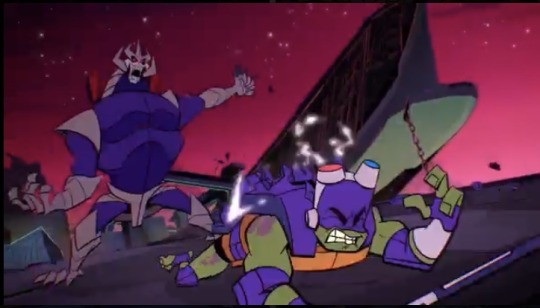
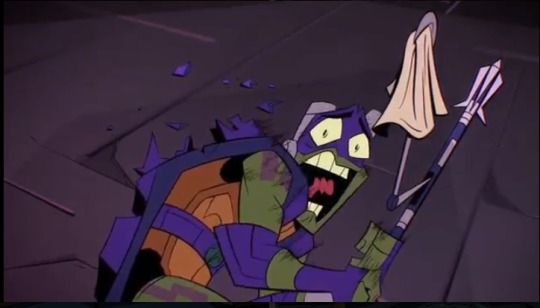
This terrifies the shit out of him because… of fucking course it does, and for the rest of the fight Donnie isn’t really like himself. He’s holding his own ok and doing what needs to be done, but he’s visibly shaky and apprehensive to kind of an alarming degree for him. There’s also pretty good reason to believe he was legitimately injured based on how deep the marks appear to be.

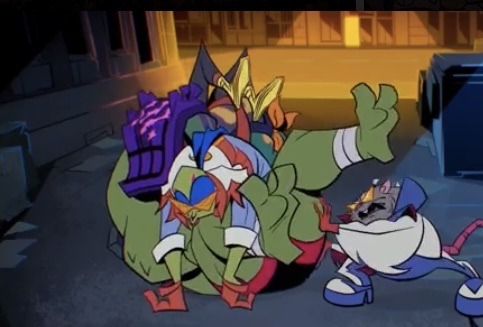
And then weeks later the second they see Shredder again (actually recognizing him that is), Raph’s immediate thought is to protect Donnie.
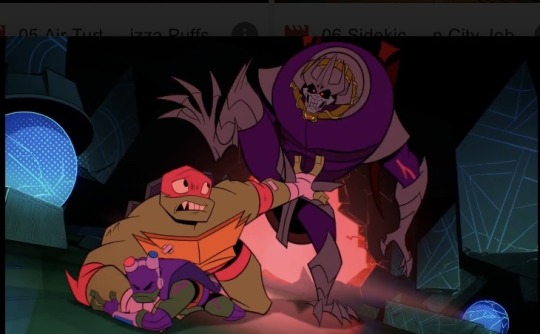
Edit: I FORGOT THE LAST PICTURE SO THIS WAS UP FOR HOURS AND MADE NO SENSE 😭

#rottmnt#rise Donnie#rise raph#donatello#rise of the teenage mutant ninja turtles#meta#analysis#continuity#Donnie’s battle shell#Donnie is disability coded (aside from the autism) you know I’m right#biceratops#tmnt
2K notes
·
View notes
Text
I forgot to actually type up a new proper post and now its 2 30 in the morning so here's the writing advice:
If you want to have an Unreliable Narrator that is not an excuse to make stuff up as you go along with no plan because "my character doesn't know whats really going on, so its fine for me to not know either"
-- in fact just the opposite. If you want a well-written Unreliable Narrator, then you, the author, need to have a solid understanding and knowledge of events that are going on around your main character, and what ripples your character sees as a consequence of the actions taking place outside of their view/understanding.
You don't need to know every single thing while writing for Novella November because we're focusing literally just on first drafts,
but it Is important that once your first draft is done , You are going to go back and do major editing to give your world consistency and make it make sense:
That things are being built up to, foreshadowed; that when something Big is revealed later in the book, It isn't literally just coming out of nowhere, you need to establish it in the background radiation of your work so that astute Readers will be able to spot the signs of its approach even if your main narrator does not, and anyone who didn't notice the foreshadowing the first time they read the book will be delighted to find all of the little bits of foreshadowing the second (or more) time through reading the book.
The best ""plot twists"" are the ones that built up to and foreshadowed within the narrative, not just doing a random, out-of-left-field twist for the sake of a twist.
Its perfectly fine, going into your novel to not have a plan and make stuff up as you go along, but once that first draft is done and its time for your second draft, you also need to make sure you're adding those things back into earlier parts of your story to have proper continuity and internal consistency.
#writing advice#unreliable narrator#continuity#internal consistency#idk what else to tag good night 💤
119 notes
·
View notes
Text
continuity 3
episode 23: escargon injects a hornworm with demon formula. dedede winces at the sight of a needle.
episode 76: escargon and dedede are forced to give blood. dedede is seen, once again, nervously averting his gaze.


81 notes
·
View notes
Text




Tales of the Dark Knight #100 | Robin: Year One #1 | Gotham Knights #11 | Bruce Wayne: The Road Home
Variations on a theme.
70 notes
·
View notes
Note
hello ! I have seen your post about greek mythology and its mischaracterization by westerners and i had some questions (im really sorry if it sounds offensive or ignorant i come in good faith). But why would a modern day greek be useful for writing about ancient greece and its culture ? Wouldnt the modern and ancient culture of greece change a lot because of the 2 millenia gap, christianization and ottoman domination ?
First of all, as Greeks and the living descendants and members of the Greek culture, we have the right to define how our heritage is presented and to have our voices heard in Greek cultural matters.
Secondly, Greeks are in very close contact with our heritage and ancient culture because we have been actively preserving it for more than 2 millennia.
We are still speaking the same language - with reasonable alterations but clearly still Greek with the same words, roots and logic. We can comfortably read and understand texts from 1000 and 2000 years ago - Koine Greek. Our customs, music, and ideas of respect for elders, heroes, important deities and heroes hold from the ancient years.
Christianity changed our religion, not our customs. Not even the structure of our temples. In fact, the anthropocentric Greek philosophy was and is part of our religion, Greek Orthodoxy.
The Ottomans made us second-class citizens and tried to wipe us out but we persisted, opening schools with our own money and surviving cultural and literal genocide.
We have a very strong archaeological sector, a ton of scholars and students who study our antiquity, and an archaeological museum in every town.
Additionally, we get educated since elementary school on the intended meaning of the myths. Since middle school (Gymnasio) we read and analyze our ancient Epics and ancient plays with graduates from classical and Greek literature studies as teachers. We also learn a version of ancient Greek, of course, from the first class of Gymnasio, when we are 12-13.
In addition, we know what happened in the years between polytheist antiquity and modern times. For most foreigners, this is a black box and they have no idea what happened to Greek culture. But we are taking exams on it.
(We study each period of our history three times during school. One in elementary, one in middle school, and one in high school). Kids who choose the Theoritiki domain learn even more and sharpen their skills enough so they compete for university entry at 17-18 years old by translating an ancient text they've never encountered before in class. (You can imagine how much study this needs, and how much consumption of ancient texts so one can prepare)
It is totally unreasonable to expect a culture to remain unchanged throughout the centuries. Not a single culture is like this. Evolution and change happens to every culture, and yet it remains a specific culture. It wouldn't be fair to deny all the ancient nations around the world the right to cultural continuation. It's just that some people cannot fathom generation after generation passing out their culture to others, but it is true in the case of the Greeks.
For someone like me who has a Greek heritage, there is an unbroken chain of Greeks all the way back to antiquity, who got passed down the Greek culture from someone else. (blood doesn't matter, just culture) The wishes, ideas, needs, and philosophy of that culture got passed from person to person, got evolved or changed based on what other Greeks wanted, or based on whatever influences were around at the time, and then got passed down to the next Greek.
In short, Greeks have this constant exposure to the wishes of the Greek people and the wisdom of our scholars early on, and the very nature of our continuous culture allows us to understand the context for many things. There are no dead Greeks you can speak to, so you can speak to the closest ancestor: a living Greek.
Scholars are also fine, of course, but when they are foreign they can have their biases or blind spots. I remember a post about Emily Wilson who translated the phrase "he is precious like my head" without taking into account how we use such phrases in Greek. To a Greek it's very obvious how this phrase is used and the context supports it. But Wilson didn't know this, so she guessed a few meanings based on a guess, guided by her own culture. I don't think Wilson's guess is better than the guess of a Greek scholar or a Greek person. Personally, I'd take more into account the opinion of the person from the native culture just because of the linguistic and cultural proximity.
Finally, in all nations, some Greeks don't care too much about their culture, but on the flipside there are many Greeks who care about it and are very knowledgeable. Both types of Greeks cringe heavily every time they see an American movie on Greek mythology, though 😂
Westerners have proven since the Middle Ages that they are viewing us under specific lends. They like to give us identities based on what they feel comfortable with, never asking our opinion or POV. So much so that when they encounter actual Greek culture they have no idea what it is. They have a separate idea in their heads and, based on that, they insist that they are the inheritors of our past. They've been calling us all sorts of names since the time of Charlamagne, viewed us through orientalist lens, sent people to loot our ancient sites again and again, called us too brown, called us too white, called us ignorant and uneducated, unable to care for our heritage, and - of course - "not real Greeks". The misconception, exoticization and sense of ownership of the Greek culture in the West have extremely deep roots.
This is a grave generalization and not directed to each individual. I'm just saying that there's history and literature just too large to ignore. No, I am not going to trust Westerners the same degree as I trust Greeks for the same reason an Indian would prefer to showcase their culture through another Indian text or person, and not by a Brit, or the same way a Native American would not trust the descendant of Spanish, German and Welsh people to showcase Native culture.
#hellas#answered#masterpost#continuity#culture#representation#greek mythology#greek culture#history#ancient history
63 notes
·
View notes
Text

I have to do this to keep my own timeline straight. I also have 32 tabs open that pertain to this story that istg feels like I'll never finish. 🤦♀️
#tevan#bucktommy#kinley#tommy kinard#evan buck buckely#buck x tommy#bucktommy fanfic#tevan fic#Writing problems#Continuity#I do this to myself#😕
60 notes
·
View notes
Text
that one barbie meme
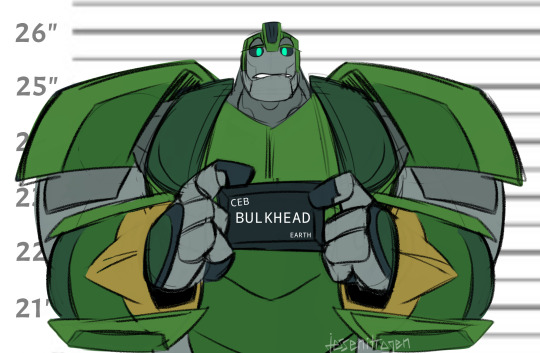
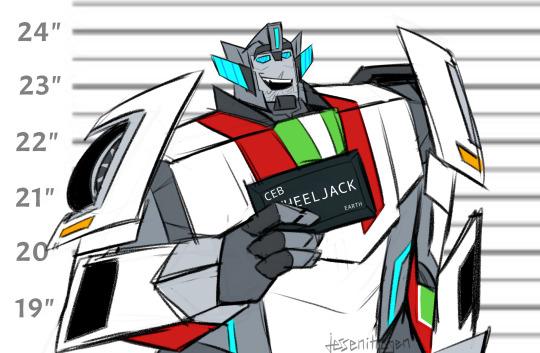
I FINALLY DRAW THEM AGAIN it's been a lil bit, arts been slow. thank you trending(?) barbie meme
anyways first date didnt go as planned/j
#didnt know what to put down for police department so Cybertronian Earth Base it is#felt like drawing my cybertronian design for bulkhead I'm still proud of it#barbie meme#transformers#tf#maccadam#tf mythos#fan continuity#continuity#au#wheeljack#bulkhead#bulkhead x wheeljack#bulkjack#tfp#transformers prime#robots in disguise#rid#my art
683 notes
·
View notes
Text
I think continuity wise Aladdin has the best pay off for their viewers.
First movie[1992]: the main characters meet, fall in love, and get in engaged.
Second movie [1994]: which is more so, why the main gang trust iago after he was a villain in the first movie.
Tv series[1994]: The main couple is engaged the whole time. Three whole seasons!
Third movie[1996]: They finally get married and we get to meet and learn about Aladdin's father.
We get to see the characters we've grown attached to over the years, finally tie the knot and it answers an important character's fact.
Small edit: I meant this post as in Disney Prince continuity not in general of all media, don't come for me. I can't fight.
#aladdin#disney aladdin#aladdin x jasmine#disney Cassim#aladdin 1992#aladdin tv series#as i say again Aladdin was their favorite#i think Tangled is an honorable mention#i think they should have done a tv movie or something more then a short for the wedding#aladdin the series#aladdin the animated series#continuity#disney continuity#The Return of Jafar#king of thieves#aladdin and the king of thieves
61 notes
·
View notes
Text
Some OC info! Poor shockwave is a mama'sboy

Took me two hours to came up with a name. Probably gonna change it.
+old art repost

#transformers#transformers fanart#transformers oc#shockwave#transformers shockwave#transformers au#transformers headcanons#Shockwave is not getting respect from decepticons with this one#nepo baby#Milligram couse you know#they SHOCK each other#I'm not very clever#continuity#whats continuity?#tf mama's boy au
51 notes
·
View notes
Text
“Love is: dying every day. Love is not memory, love is not a thought. Love is not a thing that continues as duration in time. And, through observation, one must die to the continuity of everything. Then there is love; and with love there comes creation.”
— Jiddu Krishnamurti
42 notes
·
View notes
Text
Nightwing continuity is so confusing. Please send help.
Possibly spoilers? Ahead? I have no idea.
I’m reading the Tom Taylor run (I know it ended recently, I’m only just catching up, love his take on Dick) and it seemed like it was a retcon of the whole bludhaven/blockbuster thing? Like blockbuster for sure died a while ago, right? It’s the whole reason for dicks panic attack with Catalina Flores. And a lot of the events match up, like his apartment getting bombed etc. At first I only see him, Barbara, and Tim, who is Robin when he shows up, which also makes sense for retelling that era.
But Jason and Damian both text him in the first part of the run, but didn’t Damian show up way later? And they mention Ric Grayson, which happened AFTER blockbuster for sure, and after spiral, right? I think?
If this were something like Beast Boy Loves Raven (or is it the other way around? It’s my daughter’s and I haven’t read that series) I would know to view it as a spin-off retelling not connected to the main timeline. But this is the official Nightwing comics, right? I know it’s connected in with Superman?
Everything I find online for timelines is all pre-Tom Taylor and I’m wondering if this is something other people know but I don’t? Also new52 was a thing but I can’t tell where it started in Batman’s corner of the universe? Or what actually changed?
#batman#nightwing#new52#dick Grayson#continuity#I’m so confused#blockbuster#robin#timeline#tom taylor#spoilers#except who knows#what’s a spoiler anymore#is anything real#and spoilers for what?#NOT A CLUE
21 notes
·
View notes
Text
continuity 4
episode 32: escargon peruses tago's store for toothbrushes and is shown an ultrasonic electronic toothbrush.
episode 39: escargon has the same model of electronic toothbrush in his sink cabinet.


#i feel crazy about this one. it's too cute and mundane. it makes me ill#esc#continuity#recap#32#39#krbay#escargon#escargoon
34 notes
·
View notes